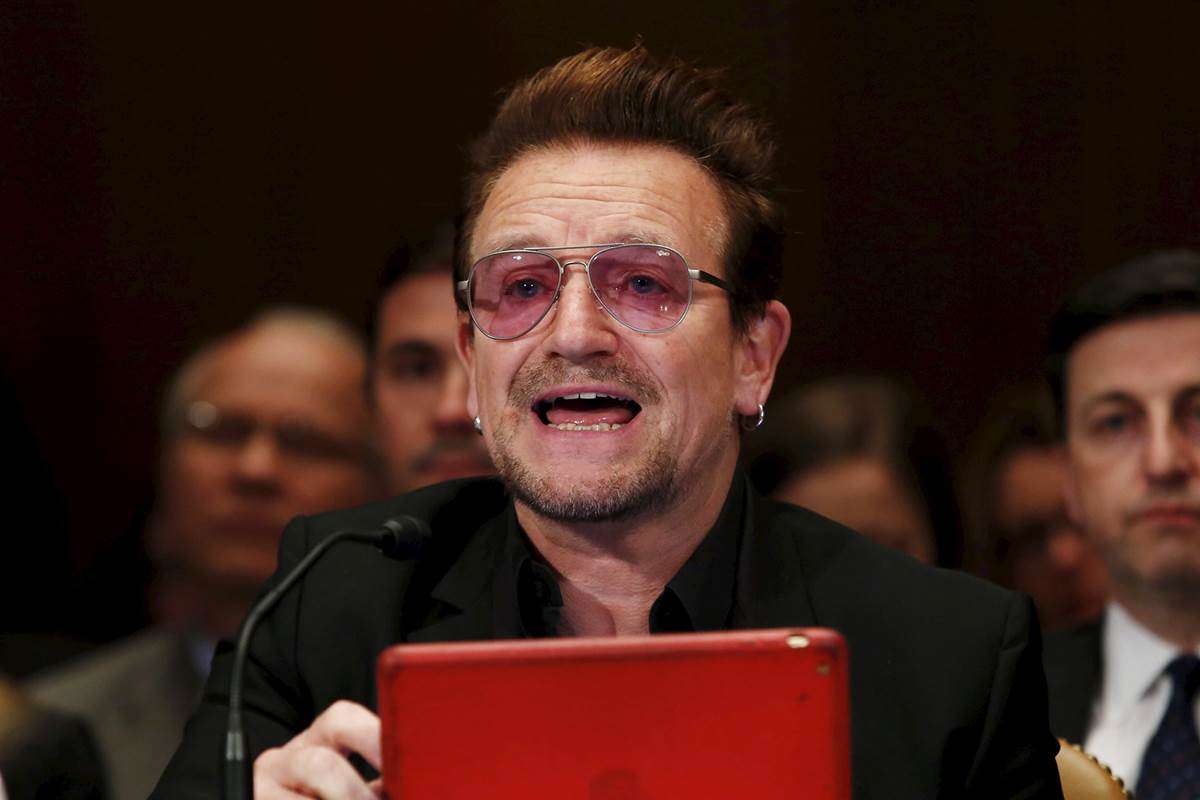Bono: Send in the Clowns To Beat ISIS
U2 frontman makes some good points in congressional testimony but mostly wallows in showbiz solipsism.

Irish singer Bono addressed a Senate subcommittee inquiring into the "causes and consequences of violent extremism and the role of foreign assistance."
When the conversation turned to how best to combat rising Islamic terrorism, Bono called sending in the shock-comedy troops. Cereally:
I think comedy should be deployed…The first people that Adolf Hitler threw out of Germany were the dadaists and surrealists. It's like, you speak violence, you speak their language. But you laugh at them when they are goose-stepping down the street and it takes away their power. So I am suggesting that the Senate send in Amy Schumer and Chris Rock and Sacha Baron Cohen, thank you.
You ask a general how to beat ISIS, he's gonna tell you to send in bombs and troops. You ask a diplomat the same question, she'll you to use diplomacy. You ask a carpenter how to beat ISIS, he's gonna tell you to use a hammer. So it shouldn't be surprising that a showbiz guy like Bono tells you to send in the clowns. Which, to be fair, is better than sending in high-art types or classical musicians. As I've noted elsewhere, people have named revolutions after rock bands but no one ever named one after Van Cliburn.
Let's give Bono some artistic license here when he suggests that artists (not comedians, by the way) were the first victims of the Nazi government (sadly, many groups can claim that sickening prize). Still, the idea that "going pffft in Der Fuhrer's face" was a major front in the war against Nazi aggression is a bridge too far. Anyone who seriously thinks that The Little Dictator or Bugs Bunny cartoons—as opposed to massive amounts of bombs, troops, tanks, bullets, and the like—turned the tide should have his head examined.
Which isn't to say that Bono didn't say some things worth considering. In the past, he's noted (with sadness!) that increasing global trade has done more to alleviate extreme poverty than aid and in his comments yesterday, he said:
'When aid is structured properly, with a focus on fighting poverty and improving governance, it could just be the best bulwark we have against the extremism of our age,' the rock star and anti-poverty campaigner testified.
But should U.S. leaders heed his call for a "Marshall Plan" for the Middle East? No, for the same reasons that held a few years ago. As even the World Bank acknowledges, increased aid erodes "the quality of governance."
(Incidentally, the whole Marshall Plan invocation is stupendously wrong as a matter of economic history. As Tyler Cowen wrote more than 30 years ago, the aid package's role in post-war recovery is a myth: "The countries which got the most help, like Greece and Austria, didn't begin to recover until the aid was nearing its end. Others, like France, Germany and Italy, were recovering even before the help arrived.")
So if not sending in massive amounts of comedians and foreign aid, what is to be done? For starters, it's probably a good idea not to spend 15 years bombing and occupying the Middle East as a prelude to fixing things up. Seriously, the lack of serious discussion about the role of war and foreign policy in conversations about "the rise of extremism" is nothing short of baffling to me. Second, the United States and other Western nations might think less about getting more involved in the day-to-day running of the Middle East and more about doing business with those countries and allowing as many people who want to leave the area find safe passage and a future in our own nations. That may be less dramatic and spectacular than letting a million ribbon-cutting ceremonies bloom at new buildings and rec centers built with foreign aid, but it would have the advantage of possibly actually helping people.
Here's another thing to consider: Islamic terrorism in Europe is being conducted primarily by Muslims born and raised in Europe itself. One of the main places that such actors are radicalized are prisons, where many of them end up because of petty crime and drug offenses. As The Influence reported recently:
An estimated 12 percent of the population of France is Muslim, while a staggering 50-70 percent of France's prison population is estimated to be Muslim. In Belgium, about 5 percent of the population is Muslim; prison figures are unreliable, but unconfirmed claims that Muslims are disproportionately represented in Belgian prisons would be in line with other European countries. (By way of comparison, in the UK, where the overall Muslim population is about 3-4 percent, the prison population is closer to 11 percent Muslim.)
There is no panacea to terorrism which, like crime, will always be with us. What "we" (meaning pluralistic, Western nations) might do is create societies that actually find meaningful ways for outsiders to assimilate (America does this well, Europe doesn't) and to not constantly intervene in places where our power to destroy is always going to be far, far greater than our ability to—what's that old term?—"nation build."
This seems like a good time to trot out "Everybody Loves Me, Baby," Don McLean's allegorical critique of U.S. foreign policy that appeared on his epic and damn-near-flawless American Pie LP. Take a spin:


Show Comments (154)